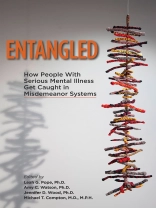People with serious mental illness (SMI) are prominently and unjustly overrepresented in the criminal legal system. More than one-third—and in some studies more than two-thirds—of those with SMI have a lifetime history of arrest. For the first time, a single volume takes a deep dive into the common behaviors, contexts, and decisions that lead to misdemeanor arrests.
Contributors representing the fields of anthropology, social work, criminology, and psychiatry draw on data from a mixed-method, multisite study (Atlanta, Chicago, New York, and Philadelphia) to examine how people with SMI become entangled in the criminal legal system and how failure to resolve underlying issues—such as underfunded social and mental health service systems and the shortage of affordable housing—plays a role.
Divided into three distinct sections, Entangled: How People With Serious Mental Illness Get Caught in Misdemeanor Systems
• Provides a historical perspective on how social, mental health, and criminal legal system policies have imperiled individuals with SMI and demonstrates the contexts that shape decision-making across misdemeanor systems.• Looks at specific misdemeanor charges that have traditionally been common for people with SMI, including criminal trespass, shoplifting, obstruction and resisting arrest, and misdemeanor assault and battery, with insight into the factors behind such charges.• Reviews necessary reforms and policy advances in the criminal legal system and the mental health crisis response system and advocates for a multisystem approach that emphasizes racial equity.
In each chapter, data-based clinical vignettes illustrate scenarios in which people with SMI have been arrested on misdemeanor charges, heightening the clinical relevance of the information. Key points summarize the main takeaways in every chapter and help readers retain important concepts.
Offering a thorough and nuanced description of current challenges as well as a vision of a better future, Entangled encourages readers to be part of crafting solutions to help individuals with mental illness—especially serious mental illness—embrace a life of recovery, hope, empowerment, and integration.
Daftar Isi
Foreword Preface Acknowledgments Part 1: Understanding Misdemeanor Systems, Contexts, and Decision-Making Chapter 1. Introduction: The System, the Process, the Contexts: Misdemeanor Arrests Among People With Serious Mental Illness Chapter 2. Using System Maps to Understand Entanglement and Guide Change Chapter 3. Decision-Making Contexts of Misdemeanor Charges Chapter 4. Common Themes and Tensions: Misdemeanor System Perspectives on Managing Behaviors of People With Serious Mental Illness Part 2: Common Types of Misdemeanor Charges for People With Serious Mental Illness Chapter 5. Being in the Wrong Place: Criminal Trespass and Criminal Legal Entanglement Chapter 6. A $25 T-Shirt from the Bargain Store: Shoplifting and Criminal Legal System Entanglement Chapter 7. Noncooperation With Officers and Using ‘Fighting Words’: Obstruction and Related Misdemeanor Charges Chapter 8. ‘That’s scary because now they’re showing violence’: Simple Assault Charges and Criminal Legal System Entanglement Part 3: Toward Reform and System Improvements Chapter 9: The Current Era of Multifaceted Criminal Legal System Reform Chapter 10. Reform in an Era of Mental Health and Crisis Services Innovation Chapter 11. Equity in Mental Health and Criminal Legal Reform
Tentang Penulis
Leah G. Pope, Ph.D., is an Associate Professor of Clinical Behavioral Medicine in the Department of Psychiatry at Columbia University’s Vagelos College of Physicians and Surgeons and a Research Scientist at New York State Psychiatric Institute in New York City.
Amy C. Watson, Ph.D., is a Professor in the School of Social Work at Wayne State University in Detroit.
Jennifer D. Wood, Ph.D., is a Professor of Criminal Justice and Vice Provost for Faculty Affairs at Temple University in Philadelphia.
Michael T. Compton, M.D., M.P.H., is a Professor of Psychiatry at Columbia University’s Vagelos College of Physicians and Surgeons and a Research Psychiatrist at New York State Psychiatric Institute in New York City.












